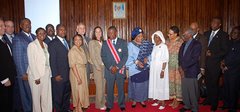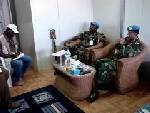Torture charges against the son of former Liberian president Charles Taylor should be dismissed because US prosecutors refuse to disclose the identity of the alleged victim, a defence lawyer said on Monday.Emmanuel, 29, also known as Chuckie Taylor, is a Boston-born US citizen accused of torturing a man in Liberia in 2002 while head of a paramilitary Anti-Terrorist Unit in his father's government.Emmanuel is the first person ever charged under a US law making it a crime for a citizen to commit torture overseas.
Withheld for his own protection"The very core of this crime is that it happened to a human being, and we need to know who that person is," said Miguel Caridad, attorney for Charles McArthur Emmanuel. "We can't preparefor trial without the name of this victim."
Withheld for his own protection"The very core of this crime is that it happened to a human being, and we need to know who that person is," said Miguel Caridad, attorney for Charles McArthur Emmanuel. "We can't preparefor trial without the name of this victim."
He was taken into U.S. custody on March 30 when he attempted to enter the United States at Miami International Airport. “'Chuckie' Taylor headed a military unit that allegedly committed egregious abuses such as burning Liberian civilians alive,” said Richard Dicker, International Justice director at Human Rights Watch. “Federal law allows for investigation and prosecution of such crimes. We look to the Justice Department to do just that.” According to information and research by Human Rights Watch and other international human rights organizations, “Chuckie” Taylor was involved in committing serious crimes from approximately 1997 through at least 2002, most notably while he headed the notorious Anti-Terrorist Unit (ATU), a unit of the Liberian government security forces. Although the younger Taylor lived in Liberia, he is a U.S. citizen who was born in the United States. It is a crime under federal law for a U.S. citizen to commit torture and war crimes abroad. “Federal laws on torture and war crimes committed abroad have been on the books for years, but we don’t know of a single person who has been prosecuted for them,” said Dicker. “How serious can the U.S. be about justice when these laws have never been used to hold our own citizens to account? With ‘Chuckie’ Taylor in custody, this is an ideal moment to wield this authority.” Recently, the U.N. Committee against Torture expressed concern that there have been no prosecutions under the U.S. criminal torture statute. According to information and research available to Human Rights Watch, during “Chuckie” Taylor’s tenure as head of the ATU, the unit committed torture, including various violent assaults, beating people to death, rape, and burning civilians alive. This information suggests that the ATU also committed war crimes during Liberia’s armed conflict from 1999 to 2003 – including extrajudicial killing of civilians and prisoners, rape and other torture, abduction, and child soldier recruitment – while “Chuckie” Taylor headed the ATU. To underscore the need for investigation and prosecution of Taylor, Jr. on torture and war crimes under federal law (18 USC sections 2340A and 2441), Human Rights Watch submitted a memorandum to the Department of Justice on serious abuses in which “Chuckie” Taylor is implicated. The memorandum includes Human Rights Watch’s research and information from other human rights organizations, along with other open source material documenting the evidence against him to date. Background on ATU Shortly after his inauguration as Liberia’s president in 1997, Charles Taylor created the ATU. The ATU was initially used in Liberia to protect government buildings, the Executive Mansion, the international airport, and to provide security for some foreign embassies. According to Human Rights Watch interviews with former Liberian combatants, the ATU’s responsibilities were expanded in 1999 to include combat and other war-related duties, after rebels from the Liberians United for Reconciliation and Democracy began operating in Liberian territory.



No comments:
Post a Comment